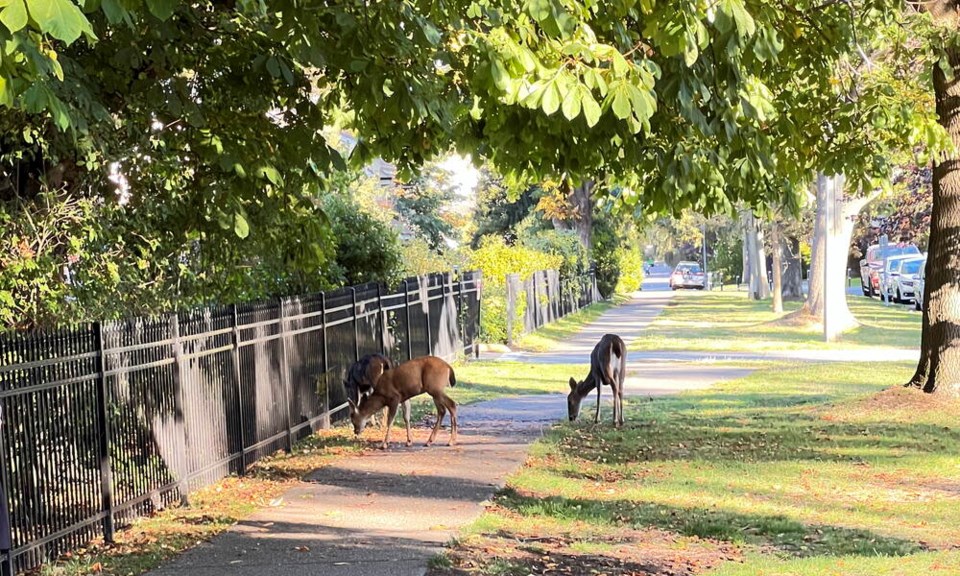A dog in Oak Bay that attacked a deer has been designated as a “vicious dog” that has to be leashed and muzzled.
The owner has been issued several municipal tickets and must post a sign on their residence alerting anyone who comes to the home that a vicious dog is living there, said Ian Fraser, manager of Victoria Animal Control Services.
The deer attack near Monterery and Brighton avenues was reported Oct. 5 to Oak Bay police, who found the deer with “a significant leg wound,” although the animal was able to run away. The dog’s owner and witnesses were at the scene.
Neither Oak Bay police nor Victoria Animal Control Services could say if the deer survived the attack.
The company has contracts with the City of Victoria, Township of Esquimalt and District of Oak Bay to licence and enforce bylaws relating to pets.
Fraser said the dog’s owner was issued four tickets, including one for a vicious dog violation that carries a fine of $260, and one for having a dog unleashed on a street. Fraser did not disclose the other bylaw infractions. The breed of the dog was not revealed. The dog owner has 14 days to pay the ticket or dispute the allegations in court.
The District of Oak Bay deems a dog “vicious” when it bites a person or animal “without provocation.” Its definition of vicious can also include a dog that has “in a menacing or terrorizing manner” approached someone on a street or other public place in an “apparent attitude of attack.”
Bylaws in Victoria and Esquimalt are similar, but use the “dangerous dog” designation, said Fraser. Those cities have timelines in which the designation can be removed.
“In Oak Bay, there is no time limit … their bylaw is dated and I understand it’s in the works to revisit that,” said Fraser.
Oak Bay’s vicious dogs bylaw says no one can allow their dog to bite, attack, terrorize or endanger a person or animal. It says an owner of a vicious dog can’t have the dog on any street, park, or other public place within the municipality unless the dog is on a leash, which can’t exceed 2.4 metres.
Dogs deemed vicious must be muzzled and held by someone strong enough to restrain the animal.
Fraser said Victoria Animal Control Services has issued 40 infraction tickets under Oak Bay animal bylaws this year — mostly leash penalties — but the deer attack was the first under the “vicious dog” bylaw.
The City of Victoria, on the other hand, has had 52 incidents where a person or another dog has been bitten this year, said Fraser. In those cases, animal control can determine how long a “dangerous dog” can be held to certain conditions based on past history, current behaviour, how significant an attack or bite might have been and other factors. The dangerous-dog designation can last anywhere from a few months to five years, he said.
Fraser said although there have been reports about dogs attacking deer, and vice-versa, tickets are rarely issued because by the time enforcement officials arrive, the dog owners or witnesses have left, or the incidents are reported days later and hard to verify.
“This certainly doesn’t happen very often,” said Fraser.
He said animal control does not usually respond to aid injured deer or remove carcasses. The saĻķľ īę√Ĺ Conservation Officer Service usually responds to calls about wildlife, and agencies like WildARC will do rescues of spotted fawns for rehabilitation.
Some municipalities do provide carcass removals, though Fraser said owners of properties where dead animals are found are on the hook for disposal costs.
>>> To comment on this article, write a letter to the editor: [email protected]



